Nutrition - Researches
Every day is a new beginning!
Seize your day, starting with a delicious breakfast!
1. CHILDREN'S BREAKFAST Milk, cereal and fruit for a strong start
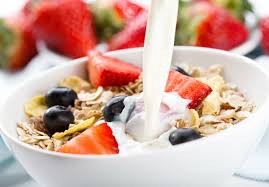
15-10-2010 / Maria Papadodimitraki //
WITH THE COOPERATION OF Mrs. LIANA POULIA, clinical dietician-nutritionist at the General Hospital of Athens “Laiko”.
Posted on vita.gr
A good day is evident from its breakfast, so let's teach our children to enjoy it.
“Break… fast”: To "break" fasting, as the British correctly define the first meal of the day, since during sleep, our body uses the glucose that it stored the previous day as an energy source. Thus, we must replenish our stores again in the morning, so that the body has the fuel it needs. A complete and balanced breakfast is essential for physical and spiritual well-being, especially in children, who have increased needs in terms of energy and nutrients.
The positive aspects of a proper breakfast
A Panhellenic survey, conducted by the Foundation "Aristides Daskalopoulos" (www.iad.gr) among people aged 3-18 years, showed that fewer than half of respondents consume an adequate breakfast, while 14% do not eat breakfast at all. However, there are many scientific studies that confirm the importance of breakfast for our good physical and spiritual condition, as it provides us with everything we need to start our day well. Indeed, the first meal of the day should cover approximately 25% of our daily caloric needs. There are other aspects of the role of breakfast in a balanced diet as well:
Against obesity: The rates of childhood obesity have increased in recent years, with Greek children being among the most obese children in Europe. Research shows that children who eat breakfast regularly are less likely to become obese than those who do not eat breakfast, since the latter group consumes larger quantities of food at noon or more unhealthy snacks during the day.
Balanced diet: During the day, children who eat an adequate breakfast consume certain foods that differ from those consumed by children who skip breakfast. Specifically, they choose a more balanced diet with less fat that is richer in nutrients (e.g. calcium, iron, vitamins A, B and C) and fibre.
Better performance: A proper breakfast also affects mental function, especially for children, by increasing their performance, providing energy to the brain. Indeed, the low levels of glucose (the basic "food" of the brain) in blood have been correlated with poor memory, difficulties in concentration and learning difficulties.
Family habit: Breakfast can become a habit that the whole family participates in and enjoys. Moreover, since children imitate their parents, if parents consume a good breakfast every day, it is likely that their children will do the same.
Save time
Nowadays, time is something not in excess. Therefore, it's good to prepare the day before. For example, make sure that you set the table the night before and have your plates, glasses and everything else necessary for your breakfast ready for use.
The required... materials
A plain glass of milk or a slice of bread with a little marmalade is not the perfect breakfast, especially for growing children, and as a result, they resort to eating potato chips and biscuits. A good breakfast, however, does not require too many things. It may, for example, include:
➜ Fruits: 1-2 fruits or 1 glass of fresh juice (e.g. orange, apple, carrot, kiwi).
➜ Dietary Fibre: 1 bowl of wholegrain cereal (e.g. wheat, corn or wheat flakes) with or without nuts and fresh or dried fruit. Alternatively, 1-2 thin slices of wholegrain bread.
➜ Dairy: 1 glass of milk or 1 low-fat yoghurt. Alternatively, 30 gr. of low fat cheese.
Cereal: a basic ingredient
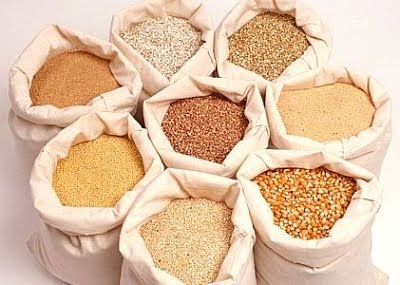
Cereal holds a prominent position on the breakfast table. It is important to know that most of cereal's nutrients are found in the husk and bran. As a result, whole grain cereal contains up to 75% more nutrients than processed varieties.
Their nutritional value
Wholegrain cereals are rich in soluble and insoluble fibre and it is advisable to include both types in our daily diet, since each one helps in a different way. For example, soluble fibre, found in foods like beans, oats, rice and apples, helps reduce cholesterol levels and promotes the development of normal microbial flora in the gut. Insoluble fibre, which is not absorbed, is found in all plant foods (e.g. cereals, whole grains, brown bread, fruit and vegetables) and maintains bowel function in addition to fighting constipation.
Wholegrain cereals also contain vitamin B complex, vitamin E, folic acid, minerals and trace elements such as magnesium, iron, phosphorus and zinc, as well as several other antioxidants (e.g. selenium) and phytoestrogens (lignans).
Why should we consume them?
Eating whole grains as part of a balanced diet, may reduce the risk of various diseases due to the sum of nutrients that whole grains contain.
Therefore, their consumption ...
➜ ... combined with a diet low in fat may help lower the risk of diabetes and cardiovascular diseases by up to 30%.
➜ ... reduces the risk of cancer of the digestive system. Fibre helps in the quick passage of food and serves as food for friendly gut bacteria.
➜ ... offers nutrients such as folic acid and phytoestrogens, which appear to have anticancer properties and which act in synergy with fibre.
➜ ... contributes to the maintenance of a normal body weight. If whole grain cereals are combined with low fat or skimmed dairy products, they are a low fat choice. Moreover, they are rich in low glycemic index carbohydrates, which means they are absorbed more slowly, gradually releasing small amounts of glucose into the blood and increasing the feeling of satiety.
CONCLUSION
A balanced breakfast that includes cereal is a good option for your child when it comes to starting the day with energy and a sense of wellbeing, since cereal offers nutrients necessary for the proper functioning of the body and is low in sugar when compared to other breakfast choices such as, among other things, cookies, stuffed croissants, etc.
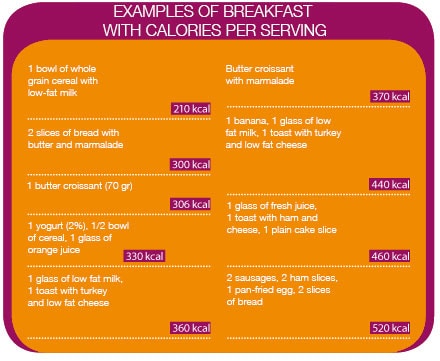
2. Breakfast: Which foods should we prefer?
By: Dimosthenopoulos Charilaos
Clinical Dietician - Nutritionist
Source: www.iatronet.gr
Breakfast is the first meal we get after a multi-hour fast, which, as is also indicated by the English term for morning meal - known as breakfast - makes it the meal that interrupts the fasting period or otherwise the period without food intake.
Being the first meal of the daily nutritional program, it replenishes both the body and the brain with necessary energy and nutrients, after the period of nocturnal sleep has passed, during which the body used blood glucose as a fuel for bodily functions that continue during sleep.
A recent large study in European countries such as the UK, France, Italy and Sweden showed that 82% of parents and 85% of children ate breakfast regularly, while 90% of Americans ate breakfast at least every other day.
In Greece, a large portion of the population does not eat breakfast. As far as children are concerned, although they get a daily breakfast in their early years, this meal is gradually phased out of their daily schedule, beginning when they start attending school.
From a study conducted by the Department of Preventive Medicine and Nutrition at the University of Crete, it was found that toddlers and preschoolers eat a full meal in the morning every day (this usually includes cereal with milk or 1 toast with milk and fruit juice), but breakfast for children aged 7-8 years is becoming increasingly rare.
When children reach the ages of 10-17 years, 30-40% of children do not eat in the morning. In a survey of 1,300 people older than 15 years conducted in early 2006 by the Daskalopoulos Foundation, it was found that 4 out of 10 Greeks leave home without eating breakfast.
The importance of breakfast in meeting our nutritional needs
Breakfast is an important meal that plays a key role in the dietary intake of children and adults. In comparison to those who eat breakfast, large studies have shown that people who do not eat breakfast tend to have lower energy levels and a lower daily intake of vitamins (e.g. A, C, E, D, B6, thiamine, riboflavin, folic acid) and metals (e.g. calcium, magnesium, phosphorus and iron).
Breakfast and body weight
A properly balanced breakfast contributes to a healthy weight and to reduced fat intake during the day. A study in the US showed that children who eat breakfast have a healthier weight than children who avoid it (Wolfe et al., Am J Pub Health 1994; 84:807-813, Haines et al., J Am Diet Assoc 1996; 5:464-470 ).
A study in France showed that overweight children eat a smaller breakfast and more at dinner than their thinner peers (Bellisle et al., Appetite 1988; 11:111-118), while a Finnish study from 2003 (researching the eating habits of 16 year old children and their parents) showed that adolescents and adults who did not eat breakfast were associated with higher BMI values (Keski - Rahkonen et al., Cl Nutr 2003; 57:842-853).
Many studies have shown that people who eat breakfast have a lower total fat intake and consume snacks more rarely during the day (Crockett et al. 2001, Tobelmann et al, 2001). Additionally, adults who maintained their weight loss were eating breakfast almost every day (Wyatt et al., Obes Research 2002; 10 (2):78-82).
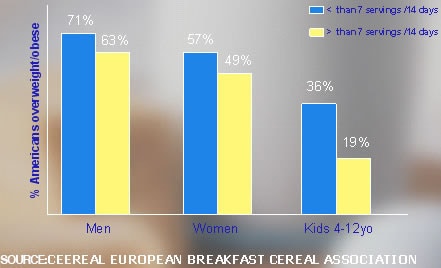
Breakfast cereals and their contribution to diet
Cereals are the most common breakfast for many countries and many age groups. Children who include cereals in their breakfast have more concentrated and nutritional diets that are also lower in fat than do children who do not consume or who eat breakfast more infrequently (Ruchton CH, Br J Nutr.1996 Mar; 75 (3) :419-31).
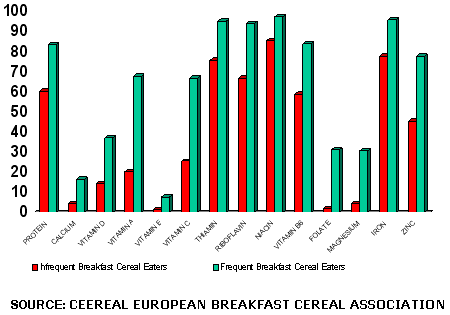
Regular consumers of cereals consumed, in 80% of cases, a moderate or a high energy load breakfast, which provided them with more than 25% of RDA for energy, while among those who ate RTE cereal, > 50% ate breakfast that provided less than 15% RDA for energy (Preziosi P et al., J Am Coll Nutr, Vol.18, No. 2, 171-178 [1999]).
Breakfast cereals contribute significantly to the total dietary intake of important nutrients. For example, a study showed that they offer 16.1% of folic acid in men and 18.6% in women, and up to 30% in children (Whittaker P et al., J Am Coll Nutr 2001; 20 (3): 247-254).
Calcium and breakfast consumption
Teenagers who consumed higher amounts of calcium and dairy products in the morning had higher intakes of calcium and dairy products during the rest of the day (Ortega RM, Am J Coll Nutr 1998; 17:19-24). In a study of children in Madrid, 65% of boys and 80% of girls aged 9-13 years had calcium intake lower than the general recommendations.
Avoiding breakfast or eating a nutritionally poor breakfast can explain why many American teenagers have low calcium intake. Studies conducted in the U.S. since the early 80s have shown the beneficial effects of eating breakfast on the improvement of overall nutritional intake, particularly in relation to data derived from dairy products, such as calcium (Morgan KJ, et al. Am J Clin Nutr 34: 1418–1427, 1981).
Folic acid and breakfast consumption
Breakfast cereals contribute significantly to total dietary intake in the United States. A study showed that they offer 16.1% of folic acid in men and 18.6% in women, and up to 30% in children (Whittaker P et al., J Am Coll Nutr 2001; 20 (3): 247-254).
The content of most breakfast cereals covers 25% of DV, and can cover up to 100% -320% of DV (especially those rich in whole wheat germ). While the recommendation for daily intake is 400 μg/d, a serving of cereal can reach 1000 μg/d.
REFERENCES
- Kellogg’s Family Health Study, 2005
- Albertson AM, Anderson GH, Crockett SJ, Goebel MT Ready-to-eat cereal consumption: its relationship with BMI and nutrient intake of children aged 4 to 12 years. J Am Diet Assoc. 2003 Dec;103(12):1613-9
- Ruxton CH, O'Sullivan KR, Kirk TR, Belton NR Holmes MAThe contribution of breakfast to the diets of a sample of 136 primary-schoolchildren in EdinburghBr J Nutr. 1996 Mar;75(3):419-31
- Nicklas TA, O'Neil CE, Berenson GS: Nutrient contribution of breakfast, secular trends, and the role of ready-to-eat cereals: A review of data from the Bogalusa Heart Study. Am J Clin Nutr 1998;67:S757-S763.
- Sampson AE, Dixit S, Meyers AF, Houser R Jr: The nutritional impact of breakfast consumption on the diets of inner-city African-American elementary school children. J Natl Med Assoc 1995;87:195-202
- Kleinman RE, Hall S, Green H, Korzec-Ramirez D, Patton K, Pagano ME, Murphy JMDiet, breakfast, and academic performance in children. Annals of Nutrition & Metabolism 2002;46 (Suppl. 1):24-30
- What do Ontario children eat for breakfast? Food group, Energy and macronutrient intake.2003 Spring;64(1):28-30
- Nicklas TA, Webber LS, Srinivasan SR, Berenson GS. Secular trends in dietary intakes and cardiovascular risk factors of 10-year-old children: the Bogalusa Heart Study (1973-1988). Am J Clin Nutr 1993;57:930-937.
- Morgan KJ, Zabik ME, Leveille GA: The role of breakfast in nutrient intake of 5- to 12-year-old children. Am J Clin Nutr 34: 1418–1427, 1981.
- Nicklas TA, Boa W, Berenson GS: Nutrient contribution of the breakfast meal classified by source in 10-year-old children: home versus school. School Food Service Research Review 17: 125–131, 1993.
- Paul Preziosi et al: Breakfast Type, Daily Nutrient Intakes and Vitamin and Mineral Status of French Children, Adolescents and Adults Journal of the American College of Nutrition, Vol. 18, No. 2, 171-178 (1999)
- Williams P. Breakfast and the diets of Australian adults: an analysis of data from the 1995 National Nutrition Survey. Int J Food Sci Nutr. 2005 Feb;56(1):65-79.
- Kafatos A, Linardakis M, Bertsias G, Mammas I, Fletcher R, Bervanaki F: Consumption of Ready-to-Eat Cereals in Relation to Health and Diet Indicators among School Adolescents in Crete, Greece. Ann Nutr Metab 2005;49:165-172
- Keski-Rahkonen A, Kaprio J, Rissanen A, Virkkunen A, Rose RJ: Breakfast skipping and health-compromising behaviors in adolescents and adults. Eur J Clin Nutr 2003;57:842-853.
- Galvin MA, Kiely M, Flynn A. Impact of ready-to-eat breakfast cereal (RTEBC) consumption on adequacy of micronutrient intakes and compliance with dietary recommendations in Irish adults. Public Health Nutr. 2003 Jun;6(4):351-63.
- Sungsoo Cho, et al. The Effect of Breakfast Type on Total Daily Energy Intake and Body Mass Index: Results from the Third National Health and Nutrition Examination Survey (NHANES III). Journal of the American College of Nutrition, Vol. 22, No. 4, 296-302 (2003)
CONTACT US
If you’re a journalist and want to get in contact,
then call us on 0161 869 5500 or
email pressoffice@kellogg.com.
Our of hours Press Office:
Our press office is staffed from 09:00 – 17:30, outside of
this please call the duty press officer on 07834 445418.
Follow us on Twitter
KelloggsUKNot a member of the press? Then call our consumer careline free on 0800 626 066.
Meet the Media team




